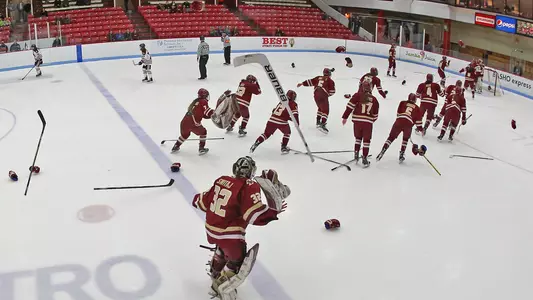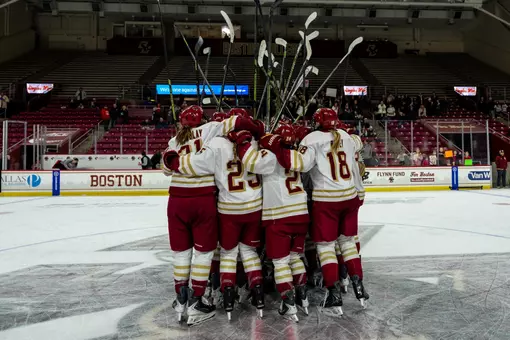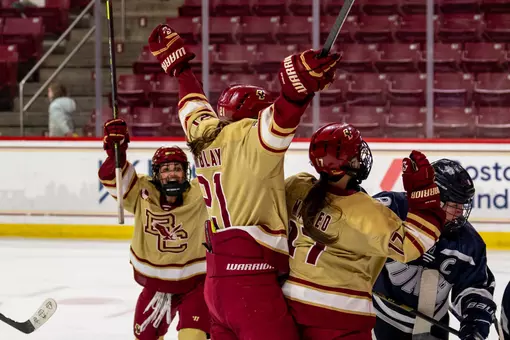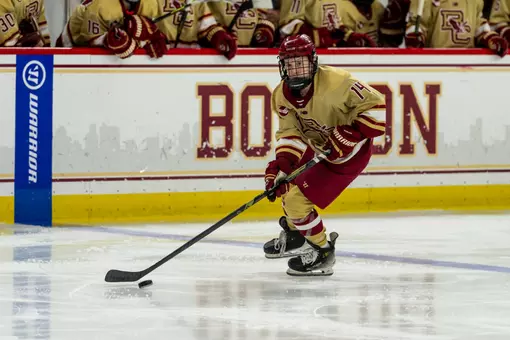Boston College Athletics

Photo by: John Quackenbos
Excitement, Intensity Permeating Beanpot's Growth
January 30, 2017 | Women's Hockey, #ForBoston Files
The Women's Beanpot is more competitive and intense than ever.
Massachusetts is a state long-known for its sporting parochialism. While the overarching professional sports culture unites fans from all over New England, people's true pride stems from the ability to call something uniquely their own.
Rivalries are more like institutions, ingrained into the very soul of each community throughout the Commonwealth.
Nothing embodies that culture quite like the Beanpot. In a hockey-mad state, it's where four schools get to separate themselves and play for a city championship unlike anything else in the sport. And while the men's game is known long for its culture, history and long-term traditions, it's something that has a relatively new impact to the women's game.
That doesn't, however, make it any less intense.
"It's really taken on a life of its own," women's hockey head coach Katie Crowley said. "It was very different back when Boston University was a club team and Northeastern and Harvard were really winning it every year. But now we see, on the women's side, why the men are so good to watch. We've really developed it with the women, and now we're at the point where the first week of the Beanpot is really a battle. So we get to see everyone's best."
The Women's Beanpot dates back to 1979, and its history is much different than the one dotting the longer, more traditional men's game. For much of its early history, only Harvard and Northeastern had full varsity status, with Boston College only have club status until 1994-95 and Boston University waiting longer until 2005-06. As a result, the Crimson and Huskies won 26 of the first 28 championships.
In one of those two championships, Boston University didn't even play, part of a two-year gap in 1993 and 1994. In '93, Brown University replaced the Terriers, defeating Harvard, 2-1, in the first round and Northeastern, 3-0, in the final. The Bears didn't return in '94, resulting in a three-team Beanpot with a double-elimination first round format eventually won by NU.
Compare that to a three-year stretch from 2013 through 2015 when three Beanpot schools, including BC and BU each year, made the national tournament. Since the 2005-06 season, there have been 11 tournaments; Boston College has won six.
"It helps the players now experience more pressure situations," Crowley said, "In the end, we're fighting to make the NCAA Tournament, and we're playing top-12 teams. It's really big on the national spectrum. This year, it's a great matchup for Hockey East especially, and we're still fighting nationally. These are games where you don't want to get too excited, but you also don't want to downplay, so you have to stay in the middle."
With the competition levels reaching new heights, the Women's Beanpot has gained the same parochial pride as the men's tournament. The four Beanpot schools have established a new level of passion and pride when they set foot on the ice.
"For the schools, there's a definite pride factor," Crowley said. "There's such pride to be called the best in Boston, especially at hockey. Boston is a great city for sports, and we all take pride in playing hockey in this city. It's very unique, and there's nothing like it."
That pride unto itself would make the Beanpot game special, but this year's first round carries with it an added layer: the Eagles open up the tournament on Tuesday against Boston University in another edition of the Battle of Comm Ave. The Eagles and Terriers haven't played a Beanpot game against each other since 2014, and they both enter the game with postseason ambition.
Only eight teams make the national tournament, half of which are conference tournament champions. At present, the Eagles are ranked fourth in the women's Pairwise Rankings, which are used to determine what teams would make the hockey tournament; they rank sixth in the voted-upon USCHO national poll.
BU, meanwhile, is unranked but receiving votes in the poll, and they're outside the bubble in 11th in the Pairwise Rankings. That puts an intense premium on a win - in the Beanpot - between teams that have developed an intense rivalry ... one of the top rivalries in the women's game.
"There are some teams that you lose to sometimes, and you ask yourself how it happens because you gave everything you had," Crowley said. "Games with BU are always a battle, and we always get their best. It stems from the men's side, and now we're seeing it on the women's side. It's fun and exciting, and it makes for a great game. We would like to see some more people be able to come and experience it because it's incredibly exciting to be a part of. And it's a big game for both of us trying to make the national tournament."
The Eagles and Terriers will skate the first round of the Beanpot on Tuesday afternoon, with a 5 p.m. puck drop at Northeastern's Matthews Arena.
Rivalries are more like institutions, ingrained into the very soul of each community throughout the Commonwealth.
Nothing embodies that culture quite like the Beanpot. In a hockey-mad state, it's where four schools get to separate themselves and play for a city championship unlike anything else in the sport. And while the men's game is known long for its culture, history and long-term traditions, it's something that has a relatively new impact to the women's game.
That doesn't, however, make it any less intense.
"It's really taken on a life of its own," women's hockey head coach Katie Crowley said. "It was very different back when Boston University was a club team and Northeastern and Harvard were really winning it every year. But now we see, on the women's side, why the men are so good to watch. We've really developed it with the women, and now we're at the point where the first week of the Beanpot is really a battle. So we get to see everyone's best."
The Women's Beanpot dates back to 1979, and its history is much different than the one dotting the longer, more traditional men's game. For much of its early history, only Harvard and Northeastern had full varsity status, with Boston College only have club status until 1994-95 and Boston University waiting longer until 2005-06. As a result, the Crimson and Huskies won 26 of the first 28 championships.
In one of those two championships, Boston University didn't even play, part of a two-year gap in 1993 and 1994. In '93, Brown University replaced the Terriers, defeating Harvard, 2-1, in the first round and Northeastern, 3-0, in the final. The Bears didn't return in '94, resulting in a three-team Beanpot with a double-elimination first round format eventually won by NU.
Compare that to a three-year stretch from 2013 through 2015 when three Beanpot schools, including BC and BU each year, made the national tournament. Since the 2005-06 season, there have been 11 tournaments; Boston College has won six.
"It helps the players now experience more pressure situations," Crowley said, "In the end, we're fighting to make the NCAA Tournament, and we're playing top-12 teams. It's really big on the national spectrum. This year, it's a great matchup for Hockey East especially, and we're still fighting nationally. These are games where you don't want to get too excited, but you also don't want to downplay, so you have to stay in the middle."
With the competition levels reaching new heights, the Women's Beanpot has gained the same parochial pride as the men's tournament. The four Beanpot schools have established a new level of passion and pride when they set foot on the ice.
"For the schools, there's a definite pride factor," Crowley said. "There's such pride to be called the best in Boston, especially at hockey. Boston is a great city for sports, and we all take pride in playing hockey in this city. It's very unique, and there's nothing like it."
That pride unto itself would make the Beanpot game special, but this year's first round carries with it an added layer: the Eagles open up the tournament on Tuesday against Boston University in another edition of the Battle of Comm Ave. The Eagles and Terriers haven't played a Beanpot game against each other since 2014, and they both enter the game with postseason ambition.
Only eight teams make the national tournament, half of which are conference tournament champions. At present, the Eagles are ranked fourth in the women's Pairwise Rankings, which are used to determine what teams would make the hockey tournament; they rank sixth in the voted-upon USCHO national poll.
BU, meanwhile, is unranked but receiving votes in the poll, and they're outside the bubble in 11th in the Pairwise Rankings. That puts an intense premium on a win - in the Beanpot - between teams that have developed an intense rivalry ... one of the top rivalries in the women's game.
"There are some teams that you lose to sometimes, and you ask yourself how it happens because you gave everything you had," Crowley said. "Games with BU are always a battle, and we always get their best. It stems from the men's side, and now we're seeing it on the women's side. It's fun and exciting, and it makes for a great game. We would like to see some more people be able to come and experience it because it's incredibly exciting to be a part of. And it's a big game for both of us trying to make the national tournament."
The Eagles and Terriers will skate the first round of the Beanpot on Tuesday afternoon, with a 5 p.m. puck drop at Northeastern's Matthews Arena.
Women's Basketball: Wake Forest Postgame Press Conference (Feb. 22, 2026)
Sunday, February 22
Men's Basketball: SMU Postgame Press Conference (Feb. 21, 2026)
Sunday, February 22
Men's Hockey: UConn Press Conference (Feb. 20, 2026)
Saturday, February 21
Women's Basketball: SMU Postgame Press Conference (Feb. 19, 2026)
Friday, February 20


















